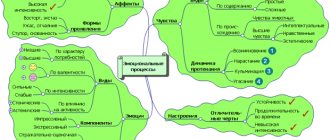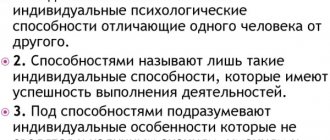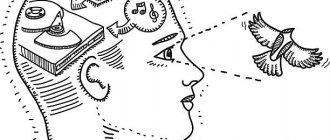Short-term memory is a type of human memory that allows you to retain a small amount of information for a short time. The duration of information storage during its one-time perception is estimated at several seconds. Short-term memory is also called primary or active memory. Short-term and long-term memory are opposed to each other; they differ in the amount of time they retain information.
Short-term memory in children can simultaneously hold no more than 5-6 elements (various images, words or numbers). In an adult, it can retain 7-9 elements for a short time. These figures are approximate, since there are individual differences in memorization.
Many scientists argue that short-term memory in children has the highest intensity of development in preschool age. It is precisely this period that is considered the basis for its further development.
Poor short-term memory can be associated with various disorders. Such disorders are pathological conditions that are characterized by the inability to store and use received information. Statistics say that problems with short-term memory occur in a quarter of the world's population. Elderly people suffer the most from problems with both short-term and long-term memory; they may experience both episodic and permanent impairments.
Short-term memory is quite vulnerable and suffers greatly from the development of pathological conditions that affect it. Problems with remembering manifest themselves in a decrease in the intensity of a person’s learning, forgetfulness and the inability to concentrate on a specific subject. At the same time, a person remembers quite well what happened to him a year or even a decade ago, and tries, but cannot remember what he was thinking about or what he was doing a couple of minutes ago.
Problems with short-term memory occur with senile dementia, schizophrenia, or with alcohol or drug use. There may be other causes of memory problems, such as brain tumors, injuries, or chronic fatigue.
Signs of a short-term memory disorder can appear immediately, in the case of trauma, or appear gradually, due to age-related changes or schizophrenia.
Content
- Short-term memory. Principle of operation
- The difference between short-term memory and working and long-term memory types
- Other types of memory
- Recommendations for improving short-term memory
- Exercises to develop short-term memory
If you've ever studied for an exam in one or two nights, you know how much information the human brain can hold, and how quickly what is memorized is forgotten later. This is how one of our types of memory works—short-term memory.
Short-term memory is an intermediate “storage” of data in which information entering the brain is stored before it is transferred to long-term storage or is completely forgotten.
Possible problems and violations
Phenomenal memory - what is it, methods for developing information memorization
Every person's memory is far from perfect. Therefore, everyone has various problems and dysfunctions of this function. Possible violations:
- Violation of consolidation. Information is not transferred from short-term storage to long-term storage. There are many reasons: lack of sleep, insufficient logical processing of incoming information, illness, hunger, and also ignorance of the mechanisms of memory.
- Impaired entry of information into short-term memory. May occur due to inattention or lack of sleep.
- Diseases. Problems occur both with a common cold (although not so significant) and with serious diseases (Pick's disease, Alzheimer's disease, brain oncology).
These problems may go away over time or get worse.
Problems at a young age
Memory tends to be better at a young age. But disorders can also occur in young people.
Students studying
The reasons are universal for any age; the following can be added to those described above:
- Fatigue. The problems are especially aggravated for students during the session. If too much information enters the brain, a protective inhibition occurs to prevent overload.
- Severe stress. The volume of RAM during periods of stress decreases by 60-70%. As a result, the intelligence of an adult is the same as that of a 10-year-old child.
- Wrong lifestyle. If you sleep little, eat poorly, smoke and drink excessively, then over time your memory will invariably begin to deteriorate, and some of the changes become irreversible.
Prevention of memory deterioration at any age is regular moderate mental stress, walking and a willingness to perceive something new.
Short-term memory. Principle of operation
As the name implies, memories are here for quite a short time - from a few seconds to several days. It happens like this:
The brain processes signals coming to it from various sources and stores them as long as they are needed for a task. The main mechanism for storing information at this stage is simple repetition. By stopping repetition, a person, as a rule, begins to forget what he remembers, thus freeing up space for storing new data that seems more relevant to him.
The capacity of short-term memory is also small. On average, this is 7 + -2 units of information - the Miller number, identified experimentally.
What is the volume of our memory
It seems that “short memory” and information instantly flying out of the head are the norm. But modern research proves that long-term human memory can hold 1 million GB. information. And that's a lot, a lot of space.
| Data store | Volume, GB. |
| 1 movie in excellent quality | 10,00 |
| Season 1 of the series in excellent quality | 100,00 |
| iPhone 7 | 256,00 |
| iCloud | 1000,00 |
| Computer hard drive | 2000,00 |
| Memory of 1 person | 1000000,00 |
| Internet traffic per second | 5000000000,00 |
Every person stores in memory not only facts, faces and numbers, but also functions: the ability to speak and move, sensory perception and expression of emotions.
1,000,000 GB.
information is contained in human memory
Our memory does not adapt to new information conditions at all, decreasing in volume. We simply stopped training and using it, so it relaxed, like a muscle without a load. Yes, there are smartphones and services for remembering passwords, electronic phone books and encyclopedias in digital format. But there are definitely things in the world that you don't want to forget. This means you will have to make an effort.
After visiting New York, I actively photographed the views so that I would have something to “feed” pleasant memories
Sooner or later, the inability to remember useful information or remember important information in a timely manner begins to negatively affect productivity, work efficiency, pleasant communication and your overall peace of mind.
Human memory is larger than the most advanced computers, so it can definitely be improved
The difference between short-term memory and working and long-term memory types
Since short-term memory is closely related to performing a task - for example, learning a ticket for an exam, or remembering a shopping list that needs to be purchased in the near future, it is closely related to operative (working) memory.
At the same time, RAM allows you to work with data entered into short-term memory - it will tell you the digits of a telephone number so that you have time to write them down, or it will remind you why you went into another room - and then erase the information that is no longer needed.
But why do we still remember that 2*2=4, that our beloved grandmother’s birthday is in June, or that Archimedes shouted “Eureka!”? The fact is that these and other similar facts have passed into long-term memory. This is where the data that we have repeated enough times is stored to convince the brain of its importance and relevance.
Thus, short-term memory is the golden mean that lies between operational and long-term types of memory and “filters” necessary memories from unnecessary ones, preserving the first and erasing the second.
Additionally
Attentiveness. It's hard to remember anything if you don't pay enough attention to it. Therefore, when you are trying to remember something, do not be distracted by something else.
Regular use. A person's memory is like his muscles - if you don't use it, it atrophies. If you are used to not relying on your memory and not trying to use it to its fullest, most likely it will reciprocate and you will not be able to count on it, even when you really need it.
A short film about memory.
Other types of memory
Of course, there are other types of memory. For example:
- Sensory
This is where signals from the senses, fleeting sensations, are received to subsequently be transformed into material for short-term memory. - Mechanical memory
It allows the body to move, function and take the desired position, automatically. It is thanks to her that we do not forget how to walk or, say, sit on a chair. - Emotional memory
It specializes in previously experienced feelings and emotions. - Logical memory
Storing data in blocks. For example: not just a food market, but where it is located, what is sold there, what are the prices, which seller is better to buy goods from...
Read more about different types of memory.
However, these types of memory are more related to the sources of memories or to the mechanisms of perception, and speaking of storage periods, dividing memory into operational, short-term and long-term is more appropriate.
What impairs memory
Short-term memory impairment occurs in two forms:
- Memory losses. You don’t remember anything at all, as if you had extracted a whole piece of information from your memory. In the worst case scenario, this disorder is associated with alcohol abuse, trauma, or even epilepsy.
- Absent-mindedness - weakening of concentration, confusion of thoughts. May be associated with stress, anxiety, and poor health.
Temporary memory impairments are called temporary because they pass. Memory is restored when the cause of stress is eliminated, after treatment or good rest.
Short-term memory failures, when, for example, you cannot remember the name of your interlocutor or the name of some object, are a common occurrence, not worth panicking, the result of fatigue or stress. But you should sound the alarm if you start:
- Frequently losing personal belongings.
- It's hard to find the right words.
- Telling the same story several times in the same company.
- Forgetting whether you took your medicine, closed the door, or turned off the stove.
- Getting lost in familiar places.
- Confusing the year or day of the week.
- Forgetting about important meetings or events.
- Have difficulty making decisions, understanding rules, or following instructions.
In case of temporary problems, the information is restored after some time: the name pops up in memory, the necessary words are found.
Permanent memory loss is a serious matter. A doctor will help you figure out the real reasons. Write down when your memory problems started, what declines occurred, what type of information is forgotten, and how it affects your daily life.
Possible causes of memory deterioration and
| Health problems | Side effects of medications |
| Unbalanced diet with low levels of B vitamins, vitamin D deficiency | |
| Alcohol abuse | |
| Diseases of the thyroid gland, heart, kidneys or liver | |
| Diabetes | |
| Consequences of head injuries | |
| Impaired blood supply to the brain as a result of spinal injuries, pinched vertebrae | |
| Emotional problems | Constant stress, high anxiety |
| Depression | |
| Consequences of emotional trauma | |
| Age | Age-related forgetfulness and memory disorders |
| Types of dementia, the most dangerous is Alzheimer's disease |
Memory problems can be associated with physical and emotional problems, but treatment and addressing the causes of stress can help improve it.
Recommendations for improving short-term memory
Short-term memory can and even needs to be developed. This will help not only learn how to retain the necessary memories, but also avoid all kinds of memory disorders in old age. There are several simple ways you can change your mental flexibility and speed of thinking.
- Attention training
- Using mnemonics
- Proper nutrition and physical activity
Let's look at each of these tips in more detail.
- Attention training
Working memory and short-term memory require full involvement in the process being performed. Voluntary attention directed to an object associated with memorization helps to better remember the material, and then transfer it to long-term memory. That is why exercises aimed at developing attention will have a beneficial effect on memory. - Using mnemonics
Mnemonic techniques are recommended for those who have pronounced problems with short-term memory. They also help transfer information into long-term memory, having a positive effect on the speed and quality of memorization. Such techniques work like this: unfamiliar and/or abstract concepts must be transformed into concrete and understandable association images. In this way, unfamiliar data is firmly connected with those that are already stored in memory, and the information is consolidated as quickly as possible and is not forgotten. - Proper nutrition and physical activity.
Correct from the point of view of the needs of the brain. It is known that improving memory - both short-term and long-term - is positively influenced by the consumption of certain foods:- containing B vitamins (especially B6, B9, B12): green vegetables, protein products, honey.
vitamins C, E and beta-carotene. They are found in berries and freshly squeezed juices.
- fatty acids and Omega-3. Their sources are sea fish and walnuts.
It is important to remember that eating a handful of nuts is not enough to instantly improve your memory. Only daily systematic consumption of necessary products will give a good effect in the long term.
As for physical activity, simple exercise and walks in the fresh air provide the brain with oxygen and nutrients, which has a beneficial effect on its functioning in general and on memory abilities in particular.
Methods to improve memory
Concentration
For information to be remembered, you need to concentrate your attention on it. Often people forget names, phone numbers, faces only because they do not attach importance to it. “It went in one ear and out the other.” The best method to solve the issue is to wake up. It has already been said that many people “dream awake” and act on autopilot. You need to REMEMBER the need to concentrate on an object in order to remember new information.
Object grouping method
Used by most people to remember information. You need to divide it into groups of 2-3 objects. With such volumes it is remembered faster. The method is often used when memorizing long telephone numbers.
Emotions
It has been proven that information accompanied by an emotional outburst is remembered better. Therefore, it is recommended to come up with a story, perhaps a ridiculous one, with which the consequences of forgetting will be associated. For example, to remember that you need to go get a haircut, you can think: “If I don’t get a haircut, I’ll get lice,” and then vividly imagine this process.
Target
Remember yourself at school - “why should I learn this? I will never… blah blah blah…” To better concentrate on what you need to learn, it is recommended to set yourself a specific goal. Without this, the brain will not be able to remember.
Associations
Information must be accompanied by simple and understandable associations. Then less time and effort will be spent on memorizing it. For example, learn a phone number to the accompaniment of your favorite melody. Sing it to music.
Repeat
The repetition method is also effective. Here long-term memory will work more. To remember better, you need to repeat the information several times.
Exercises to develop short-term memory
To develop short-term memory, it is necessary to regularly train it with the help of special exercises aimed at strengthening both memory and attention.
Attention exercises
- Mental arithmetic Solve simple mathematical examples at speed within 3-5 minutes. This will help you learn to remember answers quickly and not get distracted.
- Correction tests Practice finding certain letters or symbols in a field with similar signs for speed.
- Find the Differences Practice finding the differences between pictures. This will teach you to be attentive to details.
Effective exercises
There are many exercises to improve your memory. They are most often used for children, but also work effectively on adults. But it’s not enough to just know how to improve short-term memory with exercises. You need to exercise regularly, at least 20-30 minutes every day. For the training to take effect forever, 1.5-2 months must pass. Scientists (and you yourself feel it) have already proven that memory needs to be improved; without constant training it gradually deteriorates. To do this, you can use the most popular exercises. It is recommended to perform each of them 5-6 times daily.
- "Fibonacci Technique". It involves mentally naming a certain series of numbers. Each subsequent one is the sum of the previous ones.
- "20 words." You need someone to write 20 unrelated words on a piece of paper. You need to look at them for a minute, you can pronounce them. After that, remember. It is important not only the number of words remembered, but also their order.
- "Paragraph". Open any book at random and read the first paragraph you come across. After this, you need to retell it as close to the text as possible.
- "Pythagorean Technique". In the evening, you need to remember all the events of the day, starting from waking up. Try to reproduce them in detail and in the correct sequence.
- "Making up words." This exercise effectively activates the brain. You need to come up with 10 words for each letter of the alphabet.
You don’t have to set aside separate time for memory training exercises, but do them throughout the day. Pay attention to posters, remember 10 products on a store window, remember a song you heard in the morning. Each has its own effective methods. You can use only one exercise or use all methods. But short-term memory can and should be trained.
Consequences of memory loss
If temporary amnesia is not treated in time, it will lead to negative consequences:
- in neurodegenerative conditions that are not detected in time, the death of neurons continues, which causes Parkinson’s or Alzheimer’s disease;
- loss of information (memories of children, data from work);
- the occurrence of situations that threaten the patient’s life;
- progression of a systemic disease that is not detected in time worsens the patient’s well-being, in extreme cases causing his death;
- severe stress, depression, insomnia, nervous breakdown;
- exhaustion of the body due to insufficient supply of nutrients, leading to hormonal imbalance, anorexia.
Periodic loss of short-term memory is an alarming signal about disorders in the body. Therefore, it is necessary to consult a doctor, even if this happens once.
Interesting: Registration of disability after a stroke, procedure, groups
Where to begin
First, try to understand which type of memory impairment is bothering you more than others. This is where we should start. One of the classifications of types of memory is associated with the organ system that received the information: vision, hearing, nerves and muscles, and so on.
1. Visual memory - the ability to perceive and retain visual images in memory and mentally reproduce them. You forget faces and after a year of work you are still not sure who is your colleague in the office and who is just a visitor.
Ways to improve: try to look more closely at passers-by and later mentally reproduce their appearance in your imagination. Find old school photos and remember the name of each classmate. Don't remember a single complex password - start writing down a set of numbers that gives access to important information, but it is unwise to keep it in the public domain. Better remember all the digital combinations along the way. Learn the phone number of your favorite food delivery service, the license plate numbers of your colleagues, keep your passport number in memory - this will help.
2. Auditory memory is associated with the imprinting, storage and reproduction of auditory images.
Ways to improve: If you can’t remember what they tell you, learn a poem, like in the good old school days, or the lyrics of your favorite song. Tell your friends the plots of the books you read or the films you watched - just without spoilers, please.
3. Motor or motor memory is the memorization and preservation, and, if necessary, reproduction with sufficient accuracy of a variety of complex movements.
Ways to improve: they still didn’t remember how to use the printer at work - video games help improve motor memory, believe it or not. Gamers have better hand-eye coordination, and having to memorize control systems in different games trains the memory.
4. Spatial memory helps you find socks in the closet and return to a hotel in an unfamiliar city.
Ways to improve: if you suffer from “geographical idiocy” - mentally draw maps, count turns, and once and for all create a shelf in your closet for socks and only socks.
There is also emotional memory, which stores experiences, gustatory, tactile and verbal-logical - memory of judgments, reflections and conclusions.
Ways to improve: try to mentally return to particularly happy moments and relive the emotions. Remember the taste of your favorite dessert, the smell of your mother or child, the hug of a loved one.
Improving a certain type of memory can be done in the same way as pumping up a certain muscle: you need to use it more often
What is long-term memory?
This type of memory is considered a more reliable storage of various information. In most cases, it stores information that has personal meaning for a person or has found an emotional response in his soul. The amount of material remembered and the length of time it is stored can be completely different for all people.
A little about genetics
Psychology identifies another type of memory, which is usually classified as long-term - genetic memory. It is designed to store information about our ancestors on a subconscious level. Scientists believe that it is genetic memory that determines a person’s behavior, his character and even his destiny.
Some experts believe that this type of memorization is limited to the age of 2-3 years. However, other researchers believe that genetic memory stores information throughout a person's life. Moreover, such a “memory trace,” albeit subconscious, is the fundamental basis of the concept of “long-term memory,” which consists of long-term storage of valuable information.
Life hacks for excellent memory
Use memory techniques to commit the information you need to memory:
- Visualize. As you read a book, imagine the characters and setting. Mentally tie the name of a new acquaintance to his appearance. Masha is a tall brunette, Petya has a Spiderman tattoo on his neck. Describe the numbers in the phone number using simple images: 7 - poker, 2 - swan, 0 - donut.
- Choose associations. Rhyme information to help you remember it better. Since childhood, I have known that “A bisector is a rat that runs around corners and divides them in half.” After school, I never had to halve a corner, but the information remained in my brain forever.
- Organize your information. Clean up your mail and create separate folders for important recipients. When making a shopping list, break it down into categories: drinks, food, household chemicals. Decide on a place for important household items - a key holder, glasses on the bedside table, a remote control for the TV.
A simple key holder makes life much easier and saves time in panicky searches for keys before going out.
- Organize important things. This method was once known as the “Cicero technique” or the “Roman room method,” but the famous series about Sherlock Holmes forever cemented the name “memory palace” in the public consciousness.
It’s simple: in the imagination you create a room, or a house, a road, or even a magical forest. Things, events or concepts that need to be remembered are associated with certain elements of this space and objects in it. For example, a friend’s birthday is a balloon, a monthly loan payment is a bottomless pit. After this, it is enough to imagine this room or mentally walk along the road, remembering the associated information. By the way, if, when remembering your tasks for the week, you mentally imagine the entries on a page of a diary or even in a school diary, you are already using this technique.
By mentally imagining a diary page, you can quickly navigate the days of the week and plan things for the future or remember the past
Tricks and tricks do not impair the efficiency of memory, just as a short and fast path to the goal does not impair the quality of the road. You simply make your task easier and relieve stress by putting things in order in your head and life.
Memo
- Short-term memory holds little, but long-term memory is ahead of advanced computers in terms of capacity, so you have room to improve
- If memory impairment is associated with illness and emotional disturbances, then only treatment will help.
- The more often you use it for its intended purpose, and the less often you trust smartphones and computers to remember, the better the memory works
- If your health is good, your memory can be improved by leading a healthy lifestyle, feeding your brain with nutrients and following a proper rest schedule.
- Regular training and proper organization of any information in the head and in the surrounding space improve memory.
One of the important rules for good memory, and overall good health, is health and balance. We have prepared 15 cool tips for you that will charge you with a positive attitude and energy. Enter your email and click the download button ↓
How to improve memory quickly?
Let’s say right away that it is completely possible to improve your memory in 10 minutes or even faster. However, the effect of a short exposure on the brain will be just as short, and you will be able to evaluate it only in a short period of time while the effect persists. What are these impacts? Now we’ll tell you and start with the fastest ways to improve your memory!
Drawing
The simplest drawing or sketch will take you less than 10 minutes, and the effect, according to psychologists, will be amazing. Just draw what you need to remember. And it’s okay if it’s something abstract – at the same time you’ll develop your imagination! And when you need to remember this something, you will only need to look at your drawing. And very often a drawing is remembered already in the process of drawing.
Scientists conducted an experiment in which groups of subjects had to remember the same words. One of the groups had to learn the written words, and the second was given the task of drawing what these words mean. The experiment was carried out seven times with slight variations, and each time the participants who graphed the words remembered them better.
Details of the study can be found in the article The drawing effect: Evidence for reliable and robust memory benefits in free recall [J. Wammes et al., 2014]. And interesting examples of the practice of using this memorization technique can be found in The New York Times in the article A Simple Way to Better Remember Things: Draw a Picture (“A simple way to remember better: draw a picture”) [T. Herrera, 2019].
If you think you don't know how to draw, we invite you to our online course "Drawing". In the meantime, you can try other ways to improve your memory in less than 10 minutes.
5 minutes of exercise
A one-time 5-minute physical activity will help you remember the necessary information if you do the exercises immediately or after a short interval of time after working with material that requires memorization. This conclusion was reached by scientists who tested groups of women who received information of the same volume and complexity.
Women who began exercises immediately after training subsequently showed a better level of memorization of information than those who did not do exercises. More details about this study can be read in the final material Evidence for improved memory from 5 minutes of immediate, post-encoding exercise among women [S. Most et al., 2017].
A similar study was conducted by scientists from the University of California at Irvine and the Japanese University of Tsukuba. The experiment involved 36 young, physically healthy people who were given some information to remember. For example, pictures that had to be described from memory after a short time. Half of the subjects rested for this short time, and the other part of the group went on a short 10-minute workout.
The results clearly showed that the group remembered more after training than the rested group at rest. When at the next stage the subjects were swapped and given other pictures to memorize, it turned out that all participants in the experiment coped better with memorization after training than without physical activity at all.
Additionally, using high-resolution functional magnetic resonance imaging, the team examined the subjects' brains shortly after training and saw better connectivity between the hippocampal dentate gyrus and cortical areas, which directly affects memory. You can read more about this study on the University of California website [S. Zylius, 2018].
In general, any physical activity increases the supply of oxygen to the brain, and since the formation of new neural connections occurs in the brain and, in particular, in the hippocampus, which is responsible, among other things, for memory, even short-term physical activity prepares the brain for easier memorization of information.
Just sex
An excellent way to improve brain function and memory for an adult is sex. Thus, Canadian scientists conducted a study with the participation of 78 heterosexual women aged 18-29 years and found that those with a more active sexual life remember words much better than those who are not very active in this part of their lives.
However, the ability to remember people's faces was not affected by the frequency of sexual intercourse. The study results are described in detail in the article Frequency of Penile-Vaginal Intercourse is Associated with Verbal Recognition Performance in Adult Women (“Frequency of sexual intercourse is associated with verbal recognition in adult women”) [L. Maunder et al., 2017].
And Canadian scientists were led to the possibility of such a study by the results obtained by their colleagues from Princeton University, who studied the effect of frequency of sex on the functions of the hippocampus in rats. In experiments with rats, such a relationship was discovered, which was reflected in the article Sexual Experience Promotes Adult Neurogenesis in the Hippocampus Despite an Initial Elevation in Stress Hormones (“Sexual experience promotes adult neurogenesis in the hippocampus, despite an initial increase in stress hormones”) [B. Leuner et al., 2010].
This somehow correlates with the results of research by Canadian scientists, because the hippocampus is in charge of remembering words. Perhaps there is also an effect from physical activity, which, as we discussed earlier, promotes the formation of new neural connections in the hippocampus. It is clear that for various reasons it is not always possible to use this method. But the following method of quickly improving memory can be practiced wherever there is a flat floor surface and nowhere to trip and fall.
Walking backwards
If you walk backwards while viewing visual information, you have a chance to remember much more of what you see. This observation was shared by scientists from the University of Roehampton, who conducted six experiments in this direction and compared the results of memorization in people moving in the forward and reverse directions.
The observation turned out to be true for all types of visual information: videos, static pictures, lists of words. People who walked backwards were then able to reproduce much more detail of what they saw. Moreover, at the last stage of the experiment, it was possible to find out that a similar effect is observed, even if a person simply imagines in his thoughts that he is walking backwards.
More comments from scientists can be found on the university website in the article Psychology team conducts research indicating that backward motion improves memory (“A team of psychologists is conducting a study showing that backward motion improves memory”) [Roehampton University, 2018].
Thus, one of the scientists who conducted the experiment said that its results "demonstrated for the first time how mental time travel, caused by movement in the past, improves mnemonic performance for various types of information." Scientists call this the “mnemonic effect of time travel.”
This effect can be explained by the relationship between space and time. The relationship is noticeable even at the level of words used to describe temporal and spatial phenomena. When we say things like “many years ago” or “you still have a long way to go,” we use spatial notations (back, ahead) to refer to periods of time. Scientists believe that moving in the opposite direction caused the subjects' brains to go back in time and thus more easily access information that came into view a few minutes ago.
A little alcohol
A little alcohol can help improve brain function and memory in adults. The key word here is “a little,” because if you drink large amounts of alcohol, there is a risk of not only not remembering the required information, but also not remembering where you were yesterday and what you did. Researchers from the University of Exeter invited 88 non-drinking people aged 18 to 54 to participate in the experiment. They all received the same lists of several dozen words that needed to be learned.
After working with the list of words, half of the subjects were asked to drink any alcohol they liked, the other half were told not to drink until tomorrow. When the subjects were tested the next day on their knowledge of the words from the list, it turned out that the group that was tasked with drinking alcoholic beverages remembered much more words than the absolute “abstainers.” The results of the study were published in the article Drinking alcohol improves memory, study claims (“According to the study, drinking alcohol improves memory”) [R. Hosie, 2017].
Interestingly, the higher the blood alcohol content, the more words the subject was able to remember. On average, the amount of alcohol consumed by each participant was 4 units, which is 40 grams of pure alcohol. Scientists, as an explanation for this “alcoholic” memorization effect, put forward the version that this is due to the processes occurring in parts of the brain under the influence of alcohol during sleep. There is no clear confirmation or refutation of this hypothesis yet.
Music and meditation
For those who have already forgotten the title of the article, let us remind you that today we are discussing the topic “How to improve your memory in 10 minutes.” We initially warned that the effect of a short exposure on the brain will be equally short, and you will be able to evaluate it only in a short period of time.
Is it possible to improve memory in just 10 minutes so that the effect lasts as long as possible? If you are willing to devote 10-12 minutes a day to this, then yes! You can devote these few minutes to listening to music or meditation of your choice, and this will have a positive effect on your memory abilities. Moreover, thanks to music and meditation, even older people diagnosed with subjective cognitive decline (SCD, from English Subjective Cognitive Decline), which is a predictor of Alzheimer's disease, can improve their memory.
A large-scale six-month study was conducted with the participation of 60 people who were diagnosed with SCD. The subjects were divided into two groups. For six months, participants in one group practiced daily 12-minute Kirtan Kriya meditation (one of the practices in Kundalini yoga), and participants in the second group listened to music. The results were monitored using the Digital Symbol Substitution Test (DSST).
Both groups of subjects showed noticeable improvements in memory and other cognitive functions. Slightly higher growth rates were recorded in the group that practiced Kirtan Kriya meditation. To learn more about this study, see Meditation and Music Improve Memory and Cognitive Function in Adults with Subjective Cognitive Decline: A Pilot Randomized Controlled Trial. ") [TO. Innes et al., 2017].
Small break
And finally, a gift for everyone to whom all of the above seems troublesome and who is ready to look for magic pills that improve memory, just to do nothing. So you don’t need to do anything! In any case, immediately after studying the material that needs to be remembered. On the contrary, you need to immediately take a break and be distracted by something else, and then the material will be remembered better.
Of course, you will still have to return to the material you are studying, but that will happen later. It is enough to review the material again in an hour, then again tomorrow and the day after tomorrow, then in a week and, if you have enough patience, in another week and in a month. With each viewing, the brain will note more and more new nuances and add more and more new details to the memory, and in the end the result will be better than if you just sat in front of textbooks for 8 hours in a row.
The interval method allows you to train your brain and improve your memory so that the necessary information is kept in your head for as long as you need it. By the way, each repeated review of information will take approximately 10 minutes.
The interval method of repetition and the forgetting curve were discovered by the German psychologist Hermann Ebbinghaus (1850-1909). Ebbinghaus conducted his research using so-called “nonsense syllables,” which he invented himself and which artificially complicated the memorization process. He presented the results of his observations in the work Memory: A Contribution to Experimental Psychology (“Memory: a contribution to experimental psychology”) [H. Ebbinghaus, 1885].
The effect of intervals for memorization subsequently interested many researchers and, of course, deserves a separate article (and even more than one - one here and another here) and a special excursion into the history of the study. Those interested can learn more from The Spacing Effect: How to Improve Learning and Maximize Retention.
Now let's summarize the main ways to improve memory quickly:
- Drawing.
- Physical training.
- Sex.
- Walking backwards.
- Alcohol.
- Break.
- Music and meditation.
And then, after we presented life hacks on how to improve memory in 10 minutes, we’ll talk about what can improve brain function in general.











